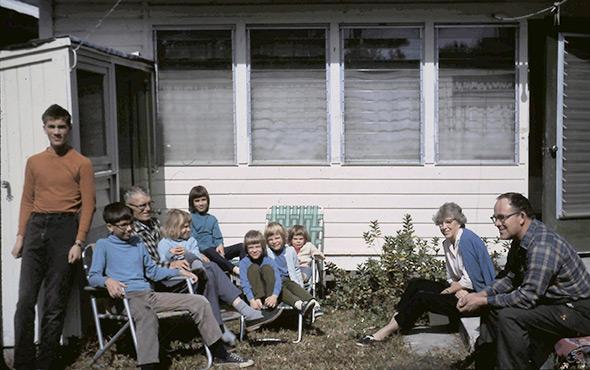Ancestry Help I Accidentally Deleted Something on My Family Tree
Deleting the Family unit Tree
When Beginnings.com shuttered its social network for relatives, information technology erased 10 years' worth of my family's correspondence and memories.

The author'southward aunts and uncles in Florida in the mid-'60s.
Photo courtesy of Jon Christian
Effectually the yr 2007, just after Thanksgiving, my grandmother noticed a tiny seed near the faucet of her kitchen sink that had somehow, implausibly, sprouted.
Intrigued, she and my grandad planted the seed in a foam cup of potting soil. Information technology grew the telltale fuzzy leaves of a baby tomato found, and then they christened it Tom the Tomato plant, transplanted it into a one-gallon milk jug with the top cut off, and left it to abound in the sunny dining room of the stately Victorian dwelling house where they had lived since 1957. Tom thrived, even producing cherry tomatoes, and eventually reached the ceiling, where they anchored him with string. My grandmother pollinated him with a tiny artist's castor.
I followed the life of Tom the Tomato on MyFamily.com, a social network for extended families launched by Beginnings.com in 1998. The Christian family is large, and when my aunt Amy signed upward for MyFamily in the early 2000s, well earlier Facebook, it swiftly became the place my relatives went to communicate—and, not incidentally, to create a tape of family history that would previously have been stored in old letters or emails. There were posts nigh trips, jobs, and a pet turtle that escaped and was finally establish down the street in a boring-motion bid for freedom. My younger cousin got in problem with the police, ran abroad from abode, and eventually cleaned up his human action. People were born, got married and divorced, grew ill and died.
"I was very conscious that we were creating family documentation," said my uncle Dean, who posted detailed travel diaries virtually the inquiry trips he fabricated to Europe while researching his dissertation. "That'southward just how I call up."
In the summer of 2014, Ancestry announced that information technology was shutting down MyFamily. Information technology was OK, the company said, because we'd exist able to export all the "family unit memories" nosotros'd posted over the years. Ancestry community manager Cara Longpre promised in a post that "photos will be exported every bit .jpeg files, videos volition be exported in the file format used to upload them, and discussion details will be exported as .txt files." The site would close down for proficient in September 2014.
My aunt Amy, who was always the account administrator, had no reason not to trust Ancestry's promise to consign our information. So after she downloaded the 748-megabyte zip file that putatively contained our collected correspondence, she merely let it sit on her calculator. She was busy, after all: She runs an independent agricultural periodical, stays active in the community, and had a kid headed off to higher.
Then when she finally opened the archive, a few months afterward MyFamily had gone to the great digital hereafter, she was horrified to find nothing but photos. More than a decade of written correspondence was missing.
"I trusted them," Amy told me afterward. "If I hadn't, I would have opened information technology up right abroad. In retrospect, I experience and then foolish."

Photo courtesy of Jon Christian
It wasn't just us. It turns out that Ancestry didn't bother to export discussion data for any erstwhile users. Reactions online, many from older people who ran sites to keep upwardly with their adult children, are heartbreaking. "Several of my family unit website members were frequent contributors to the website equally elders in the family, and all take now passed on," wrote one former user. "We volition now lose their historical memories, comments on photos, news items, recipes etc. that they left with united states on the family websites. We, and they, thought we would have these memories preserved on our websites for hereafter generations to share."
"The minute that it became obvious that it was gone, I was balked," said my uncle Dean, who teaches history at Montana's Carroll Higher.* "It's like taking two boxes of old letters in your grandmother's upstairs sleeping room and tossing them in the trash."
Ancestry consistently advertised MyFamily, which every bit of 2004 had attracted an impressive 1.five million users, equally a style to archive family history, once describing it as a fashion to "salve stories, and record dates, and so that your family can recollect and share with other generations." Until the summer before information technology close downwardly, the MyFamily homepage said that its "[u]nlimited storage space and SiteSafeSM engineering science go on all of your family memories safe and secure. No matter what."
That's why Ancestry's decision not to give dorsum the information however doesn't make sense to me. Information technology was certainly possible to export it properly; one of MyFamily's competitors, Spokt, smelled opportunity when the closure was appear and congenital its ain tool to scrape MyFamily information—including the discussions that my and other families lost—for a $69 flat fee. The problem was that you had to sign upward for Spokt's service while MyFamily was still alive; it didn't work for those of us who realized that our family unit memories had been erased but after the site was shuttered.
A sometime MyFamily software engineer told me that he was forced to preserve his own family discussions by manually saving every folio of discussions as a PDF, a chore he finished the terminal day earlier the site went night. If I'd known we were going to lose our own records, I would accept done the same.
Moreover, why not make an effort to warn users? My all-time guess is that Ancestry intended to export the information properly, striking a technical snag, and fabricated the cynical decision to non follow through, in the hopes that nobody would call the company out on it.
But we'll probably never know. Ancestry won't share fifty-fifty basic data nigh the shutdown—representatives declined to tell me how many users the site had when the closure was announced, whose decision it was not to export the data, or fifty-fifty whether our family unit history is in fact gone forever or just languishing on some unplugged server. (The visitor did eventually provide an unattributed argument expressing regret for "any defoliation or disappointment" due to the fact that information technology "ultimately adamant it wasn't feasible to render the discussion data," and claiming that it worked with some customers to export the data with a tertiary-party contractor, though a representative declined to connect me with a customer whose discussions had been successfully recovered in such a way.)
In the scheme of history, the Internet is however make-new, and nosotros're still figuring out the norms that apply to the deject. It'due south natural to assume that service providers like Ancestry will be good custodians of our data, but toward the end of a product'southward life, that agreement can be thrown out the window. "It is relatively common for this to happen," Electronic Frontier Foundation representative Adi Kamdar, who advocates for improve user control over data, told me with an audible sigh. "Whether it'south OK is a different question."
The tragedy is that without a written record, memory is transient—and lost forever to the dead. Tom the Tomato eventually withered up and died, and my grandfather passed away a year or 2 later. My grandmother, an gorging Wikipedian with exceptional recall, told me that she'd tried to remember important MyFamily posts to tell me nigh for this article. She was alarmed by the caste to which the memories had already started to fade.
"I wish I could come upwards with more concrete examples," she said, pausing. "I was hoping they would come to me in a dream, equally we read in stories."
This article is function of Hereafter Tense, a collaboration among Arizona Land University , New America , andSlate. Future Tense explores the means emerging technologies affect society, policy, and culture. To read more, visit the Future Tense blogand the Futurity Tense home page . You can likewise follow us on Twitter .
*Correction, April 23, 2015: This article originally misstated that Carroll College is in Wyoming. (Return.)
Source: https://slate.com/technology/2015/04/myfamily-shuttered-ancestry-com-deleted-10-years-of-my-family-history.html
0 Response to "Ancestry Help I Accidentally Deleted Something on My Family Tree"
Post a Comment